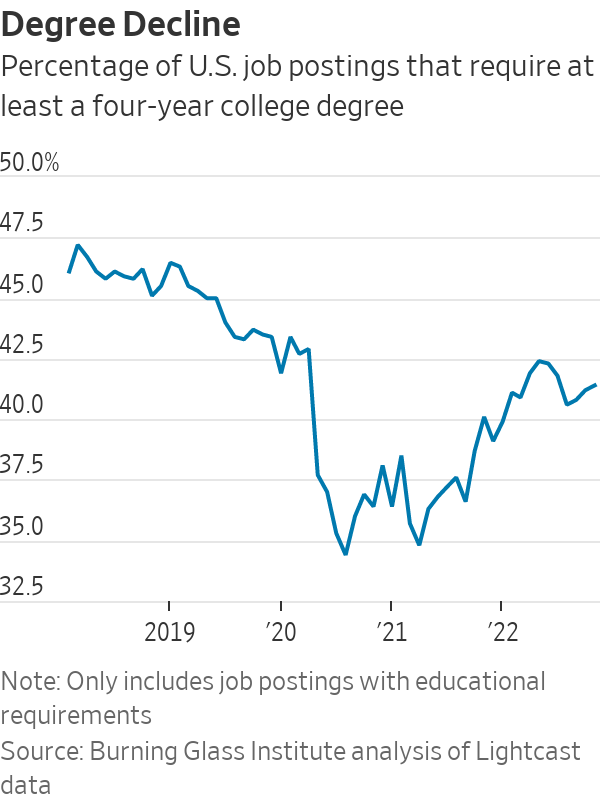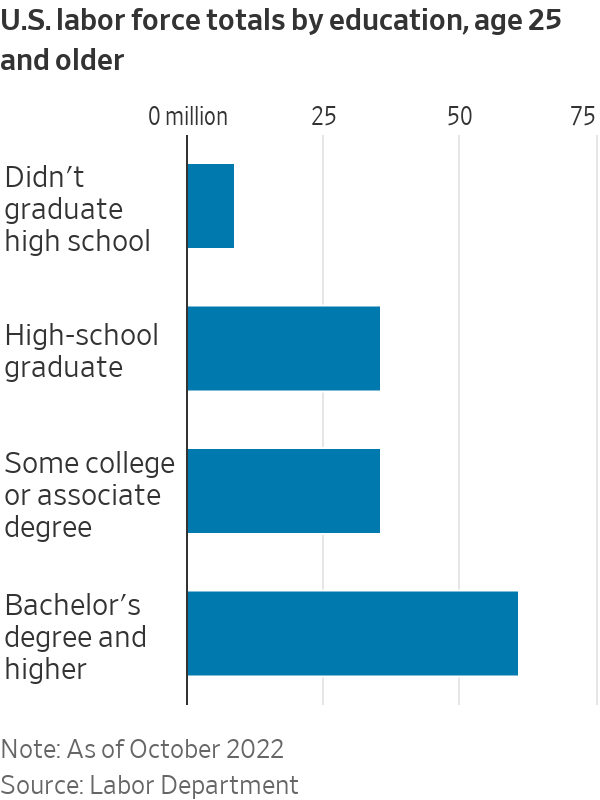Employers Rethink Need for College Degrees in Tight Labour Market
Google, Delta Air Lines and IBM have reduced requirements for some positions
The tight labour market is prompting more employers to eliminate one of the biggest requirements for many higher-paying jobs: the need for a college degree.
Companies such as Alphabet Inc.’s Google, Delta Air Lines Inc. and International Business Machines Corp. have reduced educational requirements for certain positions and shifted hiring to focus more on skills and experience. Maryland this year cut college-degree requirements for many state jobs—leading to a surge in hiring—and incoming Pennsylvania Gov. Josh Shapiro campaigned on a similar initiative.
U.S. job postings requiring at least a bachelor’s degree were 41% in November, down from 46% at the start of 2019 ahead of the Covid-19 pandemic, according to an analysis by the Burning Glass Institute, a think tank that studies the future of work. Degree requirements dropped even more early in the pandemic. They have grown since then but remain below pre pandemic levels.
The shift comes as demand for workers remains high and unemployment is low. Job postings far outpace the number of unemployed people looking for work—10.7 million openings in September compared with 5.8 million unemployed—creating unusually stiff competition for workers.
The persistently tight labor market has accelerated the trend that builds on a debate about the benefits and drawbacks of encouraging more people to attend four-year colleges and as organisations try to address racial disparities in the workplace.
Some occupations have universal degree requirements, such as doctors and engineers, while others typically have no higher education requirements, such as retail workers. There is a middle ground, such as tech positions, that have varying degree requirements depending on the industry, company and strength of the labor market and economy.
Lucy Mathis won a scholarship to attend a women in computer science conference. There, she learned about an IT internship at Google and eventually dropped out of her computer science undergraduate program to work at the company full time. The 28-year-old now makes a six-figure sum as a systems specialist.
“I found out I had a knack for IT,” she said. “I’m not good at academics. It’s not for me.”
More than 100,000 people in the U.S. have completed Google’s online college-alternative program that offers training in fast-growing fields such as digital marketing and project management, the company said. It and 150 other companies are now using the program to hire entry-level workers.
The majority of its U.S. roles at IBM no longer require a four-year degree after the company conducted a review of hiring practices, IBM spokeswoman Ashley Bright said.
Delta eased its educational requirements for pilots at the start of this year, saying a four-year college degree was preferred but no longer required of job applicants.
Walmart Inc., the country’s largest private employer, said it values skills and knowledge gained through work experience and that 75% of its U.S. salaried store management started their careers in hourly jobs.
“We don’t require degrees for most of our jobs in the field and increasingly in the home office as well,” Kathleen McLaughlin, Walmart executive vice president, said at an online event this fall. The company’s goal is to shift the “focus from the way someone got their skills, which is the degree, to what skills do they have.”
A four-year college degree holder has more lifetime earnings than one without. The lifetime earnings of a worker with a high-school diploma is $1.6 million while that of a bachelor’s degree holder is $2.8 million, according to a 2021 report by the Center on Education and the Workforce at Georgetown University.
But many people don’t finish college and are left with mountains of debt—more than 43 million people in the U.S. hold a total of $1.6 trillion in student-loan debt. While a college degree can provide specific workplace skills, workers can gain the skills needed for many jobs without a four-year degree.
Black and Hispanic people are less likely to have a college degree compared with white and Asian people, according to the Commerce Department. Men are less likely than women.
“Even though education is supposed to open up doors and windows of opportunity, they have, in some ways, become a means of closing off opportunity,” said Nicole Smith, the chief economist at the Georgetown centre.
The Ad Council, a marketing nonprofit that targets issues such as drunken driving, this summer launched a multiyear national advertising campaign aimed at reducing barriers to the workforce for non-college-degree holders. “Rethink bachelor’s degree requirements and discover a world of talent,” says one bus-stop poster.
Maryland Gov. Larry Hogan in March said the government would review college-degree requirements for every state job. State and local governments have struggled to hire workers in the tight labor market.
Half a year later, Maryland said the program is showing early signs of working as intended. The number of state employees hired without a four-year degree from May to August is up 41% from a year before while the number of all employees hired is up 14%.
Opportunity@Work, a nonprofit that wants to cut degree requirements, worked with Maryland on its program. Bridgette Gray, the chief customer officer, said there are around 70 million Americans over the age of 25 who are in the workforce today and don’t have a college degree. Around four million are already in high-wage careers.
“College is a clear pathway to upward mobility, but it shouldn’t be the only pathway,” she said.
Mark Townend, who leads recruiting efforts for Maryland’s state jobs, said reducing degree requirements was a way to tackle a societal problem and to make finding employees easier for the government. Mr. Townend and his team have been examining and rewriting nearly 2,500 job classifications for nearly 60,000 state workers.
“We basically had a need for more applicants,” he said. “There is a large population of non degree candidates who are good for our jobs.”
A recent Maryland job posting for an administrative officer paying up to nearly $80,000 a year said that the job required a high-school diploma and three years of experience. That same level job previously required four years of college.
Philip Deitchman, the head of human resources at Maryland’s Department of Juvenile Services, said he previously declined job candidates without the right credentials. The state had specification sheets that had strictly defined job requirements, he said.
“We would say, ‘Wow we want this person,’ but they didn’t have a college degree,” he said. “I’m passing up someone really good.”
Governments are less flexible and have more stringent requirements than the private sector, economists said, partly because they often have rules intended to reduce corruption and political favoritism.
Mr. Deitchman said since the policy change he is seeing more applicants and higher quality job applicants.
“I would rather have someone with experience,” he said. “It’s just something that should have been done years ago.”
Patricia Bruzdzinski works as an employee specialist for Maryland, helping state workers navigate health insurance and other human-resources issues. Ms. Bruzdzinski said she was hired at a lower level in 2016, partially because she doesn’t have a college degree. She said the new policy should help her advance in her career and open doors for others to get state jobs.
Ms. Bruzdzinski said online training resources and learning on the job have allowed her to gain new skills for her $50,000-a-year position.
“It’s also about self-education,” she said. “I listen to podcasts on Medicaid.”
 Copyright 2020, Dow Jones & Company, Inc. All Rights Reserved Worldwide. LEARN MORE
Copyright 2020, Dow Jones & Company, Inc. All Rights Reserved Worldwide. LEARN MORE
This stylish family home combines a classic palette and finishes with a flexible floorplan
Just 55 minutes from Sydney, make this your creative getaway located in the majestic Hawkesbury region.
The right foods and strategic scheduling can improve your shut-eye
Did your mum ever suggest a warm glass of milk to help you sleep?
Science says she may be right.
An emerging field of research called chrononutrition indicates that choosing the right foods and meal times may improve our sleep . Some key findings: Eat dinner early. Keep consistent schedules. And, yes, drink milk.
You already know that fruits, veggies and lean protein are good for your health. But they can boost your sleep, too. These foods are the basis for the Mediterranean diet, which research shows may improve sleep quality, reduce sleep disturbances and boost sleep efficiency—the amount of time you spend asleep when you are in bed.
Eating a Mediterranean or other similarly healthy diet is linked to a reduction in symptoms of insomnia , according to a just-published review of 37 studies with almost 600,000 participants. This same research also found that unhealthy diets—high in simple carbohydrates and processed foods —are associated with an increase in insomnia symptoms, says Frank Scheer, a professor at Harvard Medical School, who studies the internal body clock.
When we eat affects our internal body clock, or circadian system, which regulates our physiology and behaviour, including sleep. While our master clock resides in our brain, each of our organs has its own clock, too. We don’t want to wake up our stomach just when we’re trying to go to sleep.
“There’s a rhythm to our digestive system,” says Kelly Baron, director of the behavioural sleep medicine program at the University of Utah. “And eating at the wrong time can cause internal jet lag.”
Roughly a third of American adults don’t get the recommended seven to nine hours of sleep, according to the Centers for Disease Control and Prevention.
When Sarah Linderman, 46, started having sleep problems several years ago—tossing and turning for hours before drifting off, then popping awake for good at 3 am — a doctor suggested she focus on her diet.
The doctor recommended she consume more of her calories earlier in the day, load up on protein and veggies, cut back on cocktails at night and finish her last meal at least three hours before bedtime. Linderman soon found herself falling asleep more easily. She also began sleeping seven or eight hours uninterrupted and waking feeling refreshed in the morning.
“With the right nutrition, I took my sleep back,” says Linderman, who owns a marketing company in San Pedro, Calif.
What’s the best way to adjust your diet to improve your sleep? Here’s some advice, according to a growing body of research.
Follow a Mediterranean diet
A diet high in vegetables, fruits, whole grains, fish and unprocessed lean meat is good for nutrition and may promote sleep by reducing inflammation and providing nutrients that boost the neurotransmitter serotonin and the hormone melatonin. It also balances our gut microbiome , which may help regulate our circadian rhythm, says Uma Naidoo, a nutritional psychiatrist and director of nutritional, lifestyle and metabolic psychiatry at Boston’s Massachusetts General Hospital.
Some nutrients are particularly helpful.
Tryptophan is an amino acid necessary to produce melatonin. Our bodies can’t produce tryptophan, but foods that provide it include turkey, chickpeas, milk, grains, nuts and seeds.
Serotonin is also a precursor to melatonin. Fruits, vegetables and nuts can help boost serotonin.
Melatonin promotes sleep and influences the timing of the circadian system. Eggs, fatty fish such as salmon, mushrooms, bananas and tart cherries help promote it.
Naidoo’s perfect sleep-promoting dinner suggestion? A mushroom omelet with a side salad topped with flaxseed and walnuts.
Have an early dinner
People who eat close to bedtime have poorer sleep quality, studies show.
Researchers think this may have something to do, in part, with body temperature. Our body typically cools down before bed; this is an important part of our circadian rhythm. Digestion heats our body up, messing with this process.
“Your stomach is working up a sweat just as you’re trying to wind down,” says Marie-Pierre St-Onge, director of the Center of Excellence for Sleep and Circadian Research at Columbia University.
Eating before bed can also cause acid reflux, which often disrupts sleep.
A good rule of thumb, researchers say: Eat dinner at least two to three hours before bedtime to give yourself time to digest your meal.
Be consistent about meal times
Having a regular eating rhythm sends a strong signal to your brain about when it is time to be alert and when it is time to be drowsy, says the University of Utah’s Baron.
Try to eat your first meal and your last meal around the same time each day. “This bookends your day and helps differentiate between waking activities and nighttime,” Baron says.
Eat breakfast
When we don’t eat breakfast, we tend to get hungrier at night. And that sets us up for making poorer food choices closer to bedtime, says St-Onge.
Some studies have shown that people who skip breakfast have lower sleep quality. Researchers aren’t sure why, but they believe it’s because people who eat breakfast tend to practice other healthy habits, such as being more active.
Cut back on alcohol
Yes, alcohol may help you wind down at night and fall asleep faster. But it also messes with your sleep quality . (Do I really need to tell you this?) It suppresses REM sleep, causes sleep disturbances and shortens sleep duration, says Massachusetts General’s Naidoo.
A light evening snack is OK
Hunger is stimulating because the hormones that make you seek food are the same ones that arouse you from sleep, says Columbia’s St-Onge. It’s hard to fall asleep when you’re obsessing about the ice cream in your freezer.
If you eat a snack, make it light and have it at least an hour or so before bed. Pair protein and healthy carbohydrates—hummus and pita or fruit and yogurt—for the biggest sleep boost. Protein is satiating and carbohydrates promote sleepiness by helping the absorption of tryptophan.
And, yes, milk can help, too. A study of people recovering from a cardiovascular event showed that they slept better if they drank milk with honey before bed. And, in general, people who consume more milk throughout the day have better sleep, research shows. Milk is a good source of tryptophan, St-Onge says.
So go ahead and listen to your mum. Have that glass of milk.
Consumers are going to gravitate toward applications powered by the buzzy new technology, analyst Michael Wolf predicts
Just 55 minutes from Sydney, make this your creative getaway located in the majestic Hawkesbury region.
























